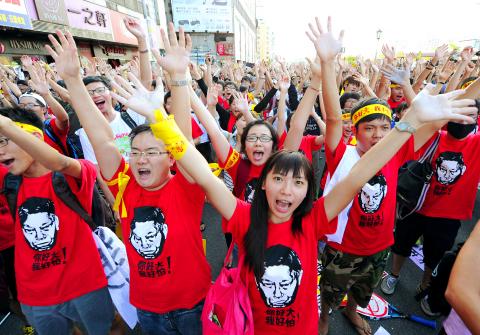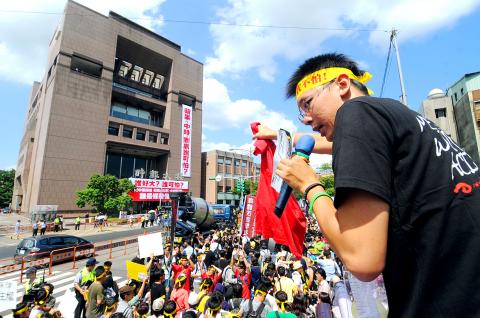Thousands of journalists, students, academics and social activists yesterday took to the streets in Taipei to protest against monopolization of the media and demanded that the National Communications Commission (NCC) help break monopolization of the media.
“No to monopolization of the media, protect professionalism in media,” thousands chanted as they marched from Want Want China Times Group (旺旺中時集團) headquarters to the NCC headquarters in Taipei.
Many of the demonstrators held home-made signs and placards with slogans against media monopolization or the Want Want China Times Group, such as “You’re big, but I’m not scared,” “I would like my news without additives” and “Non-professional media operators should go back to making biscuits.”

Photo: CNA
One woman taking part in the march wore a mask that looked like two hands covering her eyes and held a sign reading: “Media monopoly blinds my eyes.”
“We are gathered here because we are upset that [Want Want China Times Media Group chairman] Tsai Eng-ming (蔡衍明) used media outlets under the group as his own personal tool to attack his enemies. We’re also worried that when the group gets its hands on the largest cable TV service provider, it will be a disaster for the country,” Association of Taiwan Journalists (ATJ) chairwoman Chen Hsiao-yi (陳曉宜) told the crowd.
The ATJ, along with the Campaign for Media Reform, Taiwan Media Watch, the Alliance against Media Monsters and the Youth Alliance against Media the demonstration.

Photo: Lo Pei-der, Taipei Times
“We are here to demand our freedoms of expression and of media,” Chen said. “We call on Tsai to give up his merger plan with China Network Systems (CNS, 中嘉網路).”
Chen was referring to a Want Want plan to acquire some of the cable TV services owned by CNS, the largest cable TV service provider in the country, that was conditionally approved by the NCC last month.
The merger plan has worried many because the Want Want China Times Group already owns several media outlets, including newspapers, a magazine, TV channels and a radio station. Opponents worry that if Want Want buys CNS’ cable TV services, it may be able to interfere with other media outlets, with the power to decide which channels may be broadcast via cable.
The issue did not attract too much public attention until last month, when all media outlets under the group launched a series of reports accusing the Academia Sinica research fellow — who is a strong opponent to the merger case — of paying students to join anti-merger rallies, which was later proved to be false.
When one National Tsinghua University student, Chen Wei-ting (陳為廷), questioned Want Want’s motives, he also became a target of criticism by media outlets under the group.
“CtiTV [of the Want Want China Times Media Group] aired news reports criticizing me 24 hours a day during that time, and each news report could take as long as 15 minutes of air time,” Chen Wei-ting said. “This shows how horrible things could get when a media group has a monopoly.”
Some foreign students also joined the march.
Chong Yee-shan (張玉珊), from Malaysia, said she joined because media monopoly is also a serious problem in her own country, especially in Chinese-language media outlets.
Several human rights groups, such as the Taiwan Association for Human Rights, the Deng Liberty Foundation, Taiwan Students for a Free Tibet, Taiwan Labor Front (TLF) and the Humanistic Education Foundation, participated.
“The media issue is important for social groups, especially those who are working for the rights of the disadvantaged in our society,” TLF secretary-general Son Yu-lian (孫友聯) said. “When all media outlets are in hands of big corporations, disadvantaged people will be silenced.”
Journalism students were among the most predominant groups in the march.
“I want to become a journalist when I finish school, so I am concerned about the work conditions for journalists,” said Kuo Chih-jung (郭芝榕), a student at National Taiwan University’s Graduate Institute of Journalism. “I would like to call on the government to help maintain the independence of media outlets.”
Another journalism student surnamed Lee (李) said she was concerned about how the awareness and energy of the demonstration could be maintained, so that real reform of the media could succeed.
The parade ended in front of the NCC headquarters, as the crowd called on the institution to make or revise laws to help maintain the independence of media outlets, which an NCC official who accepted a petition from ATJ head Chen Hsia-yi promised to help out.
In response, Want Want China Times Group published a full-page advertisement in the China Times yesterday asking: “Who is big? Who is scared?”
“Our news reporting has been always professional and can be scrutinized. We welcome all criticism,” the advert said.
Additional reporting by CNA

INVESTIGATION: The case is the latest instance of a DPP figure being implicated in an espionage network accused of allegedly leaking information to Chinese intelligence Democratic Progressive Party (DPP) member Ho Jen-chieh (何仁傑) was detained and held incommunicado yesterday on suspicion of spying for China during his tenure as assistant to then-minister of foreign affairs Joseph Wu (吳釗燮). The Taipei District Prosecutors’ Office said Ho was implicated during its investigation into alleged spying activities by former Presidential Office consultant Wu Shang-yu (吳尚雨). Prosecutors said there is reason to believe Ho breached the National Security Act (國家安全法) by leaking classified Ministry of Foreign Affairs information to Chinese intelligence. Following interrogation, prosecutors petitioned the Taipei District Court to detain Ho, citing concerns over potential collusion or tampering of evidence. The

NEGOTIATIONS: Taiwan has good relations with Washington and the outlook for the negotiations looks promising, Minister of Economic Affairs J.W. Kuo said Taiwan’s GDP growth this year is expected to decrease by 0.43 to 1.61 percentage points due to the effects of US tariffs, National Development Council (NDC) Minister Paul Liu (劉鏡清) said at a meeting of the legislature’s Economics Committee in Taipei yesterday, citing a preliminary estimate by a private research institution. Taiwan’s economy would be significantly affected by the 32 percent “reciprocal” tariffs slapped by the US, which took effect yesterday, Liu said, adding that GDP growth could fall below 3 percent and potentially even dip below 2 percent to 1.53 percent this year. The council has commissioned another institution

NEGOTIATIONS: The US response to the countermeasures and plans Taiwan presented has been positive, including boosting procurement and investment, the president said Taiwan is included in the first group for trade negotiations with the US, President William Lai (賴清德) said yesterday, as he seeks to shield Taiwanese exporters from a 32 percent tariff. In Washington, US Trade Representative Jamieson Greer said in an interview on Fox News on Thursday that he would speak to his Taiwanese and Israeli counterparts yesterday about tariffs after holding a long discussion with the Vietnamese earlier. US President Donald Trump on Wednesday postponed punishing levies on multiple trade partners, including Taiwan, for three months after trillions of US dollars were wiped off global markets. He has maintained a 10 percent

TRADE: The premier pledged safeguards on ‘Made in Taiwan’ labeling, anti-dumping measures and stricter export controls to strengthen its position in trade talks Products labeled “made in Taiwan” must be genuinely made in Taiwan, Premier Cho Jung-tai (卓榮泰) said yesterday, vowing to enforce strict safeguards against “origin laundering” and initiate anti-dumping investigations to prevent China dumping its products in Taiwan. Cho made the remarks in a discussion session with representatives from industries in Kaohsiung. In response to the US government’s recent announcement of “reciprocal” tariffs on its trading partners, President William Lai (賴清德) and Cho last week began a series of consultations with industry leaders nationwide to gather feedback and address concerns. Taiwanese and US officials held a videoconference on Friday evening to discuss the